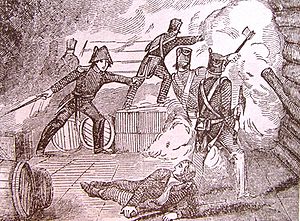Siege of Fort Harrison
| Siege of Fort Harrison | |||||||
|---|---|---|---|---|---|---|---|
| Part of the War of 1812 | |||||||
 Captain Zachary Taylor defending Fort Harrison in the War of 1812 |
|||||||
|
|||||||
| Belligerents | |||||||
|
Native Americans Miami Potawatomi Kickapoo Winnebago |
|
||||||
| Commanders and leaders | |||||||
| Stone Eater | Zachary Taylor | ||||||
| Strength | |||||||
| 600 | 20 healthy, 30 sick | ||||||
| Casualties and losses | |||||||
| Unknown – believed to be several killed or wounded |
- 2 killed before battle (civilians) |
||||||
- 2 killed before battle (civilians)
- 3 killed, 3 wounded during battle
The Siege of Fort Harrison was an engagement that lasted from September 4 to 15, 1812. The first American land victory during the War of 1812, it was won by an outnumbered United States force garrisoned inside the fort against a combined Native American force near modern Terre Haute, Indiana.
In 1811, while General William Henry Harrison marched his army north to meet the Indians at the Battle of Tippecanoe, the army encamped on the high grounds of Terre Haute and constructed a fort overlooking the Wabash River. Harrison had long advocated building a fort in the strategic location.
The fort protected the army's supply lines, as well as the capital of the Indiana Territory downstream in Vincennes. The site, located in present-day Vigo County, Indiana, at the northern edge of Terre Haute, was only two miles from the Wea village of Weauteno. It was said to be the location of a historic battle involving the Illiniwek, and was initially called Camp Bataille des Illinois. Major Joseph Hamilton Daveiss proposed that the stockade be named Fort Harrison in General Harrison's honor. The fort was finished October 28, 1811, and had a 150 feet (46 m) stockade encircling the post. Leaving the fort and a small garrison under Colonel James Miller, Harrison led his army to the Tippecanoe battleground, where it confronted an army led by the Shawnee prophet, Tenskwatawa.
...
Wikipedia
